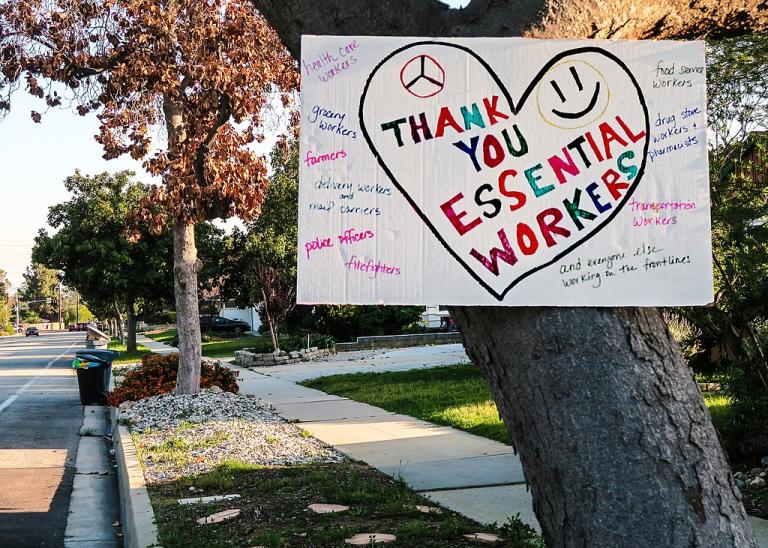President Biden’s vaccine mandate–requiring businesses with over 100 employees to fire those who refuse to be vaccinated or submit to weekly testing–was already in trouble before it went into effect.
The original start date for the mandates was December 8, but President Biden, at the urging of businesses, moved that back to January 4, so as not to spoil Christmas. That way, workers defying the vaccination rules, would find themselves unemployed right before the holiday. Also, businesses persuaded the president that the mass firings would further disrupt the supply chain, so that consumers would have a more difficult time than they already facing are in buying Christmas presents. Thus the postponement was a tacit admission that the mandate is going to have a bad impact on the economy.
Trucking industry spokesmen said that 37% of the nation’s truckers were refusing to get vaccinated and so would lose their jobs because of the vaccine mandate. This would be on top of the current shortage of 80,000 truck drivers. So the Labor Secretary ruled that most truck drivers, since they mainly work shut up in a cab by themselves, would be exempt.
Legal challenges were filed by 27 states. Last week a federal judge issued a temporary stay, halting the implementation of the president’s federal mandate until a full legal hearing can be conducted.
The judge, responding to a suit brought by the state of Texas, judge cited “grave statutory and constitutional” issues. Indeed, there are. It isn’t just a question of individual liberties. There is plenty of legal precedent for allowing private companies to require vaccinations and other health measures during pandemics. But what gives the President the right to require private companies to discharge their employees or to levy $14,000 fines per unvaccinated worker if they don’t?
The Biden administration says that it will appeal any ruling not in its favor. And an injunction against a federal mandate will not necessarily put an end to the state, local, and private company mandates that are already being imposed and that, by legal precedent and recent court rulings, are indeed legal.
All of these vaccine requirements are stoking what’s being called a “worker rebellion.” A Reuters story on the subject is entitled From Boeing to Mercedes, a U.S. worker rebellion swells over vaccine mandates. Quoting workers, union leaders, and company executives, the article says that thousands of Americans would lose their jobs over President Biden’s plan. Big manufacturers, such as Boeing and Mercedes, as well as crucial services such as FedEx and UPS, are are already dealing with a paralyzing labor shortage that is going to get worse.
This defiance is already a problem for public safety. New York City, which has already implemented a mandate of its own, has had to close 26 fire stations, since one-third of its firefighters refused to get vaccinated. Police officers are particularly resistant. In Chicago, a third of the police officers are defying the vaccination order. Seattle, Los Angeles, and the state of Massachusetts are facing similar problems, even as the crime rate surges.
Los Angeles County Sheriff Alex Villanueva has said, “I have repeatedly stated the dangers to public safety when 20%-30% of my workforce is no longer available to provide service, and those dangers are quickly becoming a reality,” citing increased response time and decreased patrols.
The mandate is also hitting our military. The Pentagon set its own deadline of November 1, so punishments are already underway, since refusing to get vaccinated amounts to disobeying an order. Troops are taking advantage of a court order that reprisals could not begin until appeals for exemptions on medical or religious grounds are completed. But the number is concerning. So far, those discharged have been limited to new recruits in basic training, but the Air Force has 10,000 airmen who have refused the vaccination. The Marines are gearing up for court martials and discharges for the 7% of the force that remain unvaccinated.
The mandate is causing big problems for airlines, causing pilot and crew shortages that are already causing flight delays and cancellations.
Furthermore, thousands of health care workers–whom we depend upon to take care of COVID patients–are also refusing the vaccine and have been turning in their resignations where they are forced to get one.
In fact, the “essential workers” that were so praised in the early days of the pandemic are among those most likely to be punished for not accepting the vaccine!
If Biden’s January 4 deadline is upheld, the time is running out for businesses and employees to get compliant, if that is their decision. Since becoming “fully vaccinated” takes two shots, with Pfizer needing three weeks between them and Moderna needing four weeks, workers would need to get their first one by December 14 (Pfizer) or December 7 (Moderna), unless they opt for the less-effective one-dose shot from Johnson & Johnson.
In the meantime, according to this fact sheet, employers must have their plan in place and require unvaccinated workers to wear masks by December 5. Employers must decide whether they will offer a weekly testing option and whether they will pick up the tab for that, which may cost $500 per year, or require the unvaccinated employees to cough up the money.
Emotions are going to get even higher once public schools implement their own vaccine mandates for children, once all age groups are approved. San Francisco is already planning to require children as young as 5 to be vaccinated, not only to go to school but to participate in indoor activities, such as eating in restaurants.
One question is why isn’t there an option to exempt people who have already had COVID from the vaccination requirement? There is evidence that natural immunity from having contracted the disease is higher than vaccine-induced immunity. Another study questions that. But surely the criterion should be having sufficient antibodies, rather than the fact of getting the jabs. Couldn’t that be measured?
Those of us who are vaccinated have a great deal of protection from hospitalization and death from COVID, even if there is a small chance that we might pick up a mild form of the disease. If the unvaccinated are taking a risk, why not let them do so? Herd immunity does not require everyone in the population to get vaccinated. When enough people get vaccinated or have survived the disease, chances of transmittal dwindle.
The government wants to force people do what it thinks is best for them, even if it is against their will and even if it means harming them.
And prudentially, is it wise to inflict such harm on individuals, businesses, and the economy as a whole at a time when the pandemic appears to be receding?
Photo: A thank you to essential workers in 2020, by Russ Allison Loar, CC BY-SA 4.0 <https://creativecommons.org/licenses/by-sa/4.0>, via Wikimedia Commons













